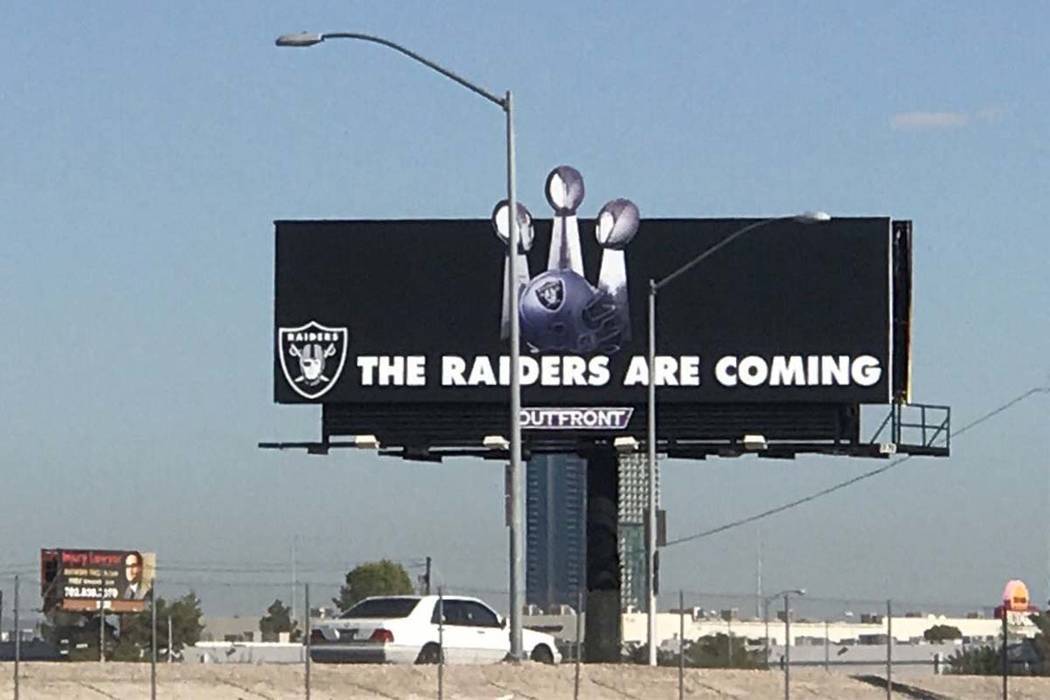Key talks on Raiders Stadium poised to enter home stretch

The home stretch for completion of a stadium development agreement with a firm price begins Thursday with the December board meeting of the Las Vegas Stadium Authority.
The estimated $1.9 billion, 65,000-seat stadium is being built by a subsidiary of the Oakland Raiders, who intend to relocate to Southern Nevada by the 2020 season. The public is contributing $750 million toward construction costs through an increase in Clark County’s hotel room tax.
Authority members will gather at 1 p.m. at the Blasco Event Wing of the Foundations Building on the UNLV campus, an appropriate setting for one of the key agenda topics: a discussion of the UNLV joint use agreement.
The agreement, which would spell out the Rebel football team’s access to the stadium and the use of everything from locker rooms to luxury boxes, must be completed before the development agreement can be signed.
By law, the agreement must be signed by April 16, when the stadium authority would sunset if it didn’t have a deal in place with an NFL team. But representatives of the authority and the Raiders are hoping to complete things by February.
Any delay past February could jeopardize the construction timeline to complete the stadium by the start of the 2020 season. Authority Chairman Steve Hill scheduled a second meeting for January in a bid to wrap up details of pending agreements by February.
The Raiders have been mum about the status of the UNLV joint use agreement. But in an interview in November, UNLV President Len Jessup said the two sides are close. He wouldn’t say what issues remain after several face-to-face and telephone conference meetings between the two sides.
Special meetings
Jessup said that once an agreement is reached, it will be reviewed in two special meetings of the Nevada Board of Regents, which will have to sign off on the deal. The first meeting would introduce the agreement and enable regents to ask questions, and the second would be for regents to debate and vote.
UNLV’s planned use of the stadium is a key reason Nevada lawmakers in a 2016 special session approved the $750 million public financing package to help build the stadium. Officials at UNLV have long believed that having an on-campus stadium would improve its football fortunes.
The 40,000-seat Sam Boyd Stadium, opened in 1971, is 7½ miles from campus, discouraging student attendance.
While the stadium the Raiders are building isn’t on campus, it’s much closer: about 3 miles away. And the modern amenities of the stadium would be used as a player recruitment tool.
Ultimately, UNLV officials hope a big boost in the football program will catapult the school into a Power 5 conference, which would generate higher levels of revenue for athletics as well as academics.
The potential for UNLV to play in the stadium already has gotten the attention of the University of California, Berkeley, which Jessup said had contacted the school about playing the Rebels in the first collegiate football game at the stadium once it’s built.
Thursday’s meeting agenda also includes three other updates in advance of completion of a stadium development agreement.
Community benefits plan
The board and the Raiders will also take another swing at a community benefits plan detailed in the November meeting.
While Raiders legal counsel Dan Ventrelle in November called the proposed plan the best ever drafted for a stadium construction project, authority members said they wanted greater assurances that the Raiders would target a higher percentage of workers from qualified minority and small-business contractors in all jobs, not just game-day workers.
The team has targeted workforce participation of not less than a combined 55 percent of work hours on days events take place at the stadium.
Thursday’s agenda also includes an update on the land dedication agreement that will turn the stadium over to the authority once it is built and a nonrelocation agreement that assures the Raiders will stay in Las Vegas for at least 30 years.
Contact Richard N. Velotta at rvelotta@reviewjournal.com or 702-477-3893. Follow @RickVelotta on Twitter.












